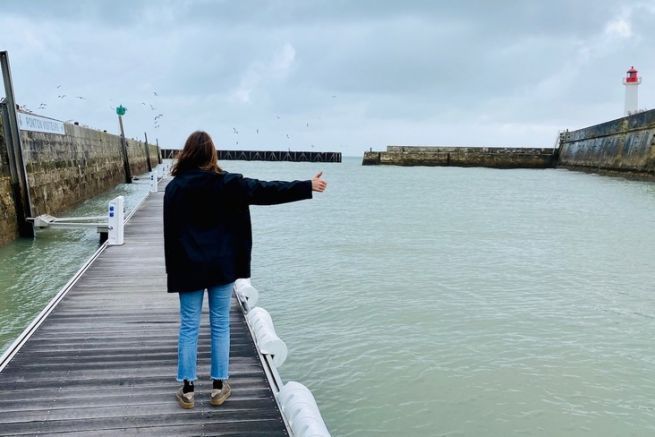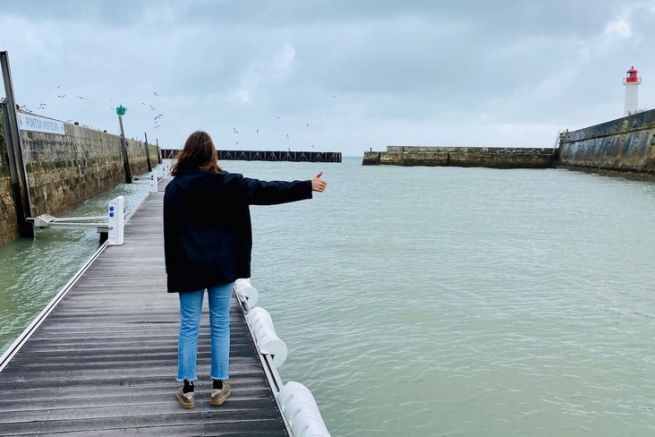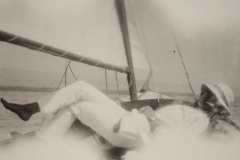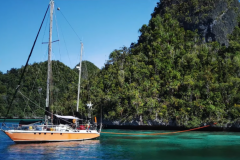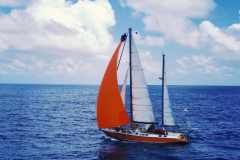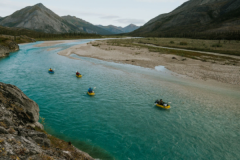There are various co-navigation platforms such as the Crew Exchange, Vog with me, Sail the World, Findacrew, Ocean Crew Link, Crew Seekers that allow boat owners to post boarding offers online. They are looking for crewmates to accompany them for a few days or several weeks at sea and you could be part of the adventure!
Here are a few tips before boarding.
1. Have already done a night navigation
It is preferable, before embarking on a hitch-hiking adventure, to have already sailed at least once, day and night, and to have the basics of navigation (know the basic vocabulary). This will allow you to know what you are going to embark on and to check that you are not seasick and that you can bear to be on the open sea at night.
2. Select the ads and exchange with the owners.
If an ad looks suspicious to you, don't even go there. Once you have managed to select boarding offers that correspond to your project (dates, route and language of the crew), we advise you to talk to the owners to find out their level of experience at sea" How long have they been sailing, what cruises have they already done, have they taken training courses ... What is the model and equipment of the boat? ( year of construction, with or without shower, with or without hot water, individual cabin or not) ". This exchange will allow you not to be surprised about the comfort on board. You can exchange on the owner's habits "pace of life, eating habits, whether or not to drink". Do not hesitate to ask for contacts from people who have already left with them so that you can get feedback. You can also ask under which flag the boat is registered. Indeed, safety equipment differs according to the flag, so it is important that you know this before you leave.
3. Validate the financial cost of the trip
Even if the stop-boat allows you to sail at a lower cost. It will be necessary to make sure beforehand of the amount of the "cash on board" and to know the costs you will have to participate in. In most cases, the owners ask for a contribution to food and diesel, an amount that is divided according to the number of people on the boat. Other owners also ask for a contribution to the costs of the berth or the work. It is therefore preferable to be precise on this subject before embarking on the adventure!
4. Ensure that you are up to date at the administrative level
When you arrive in a country by sea, there is going to be a customs check, just as there would be if you arrived in a country by air or by land. Either the customs officers will come directly to the boat or you will have to go and declare yourself at the nearest immigration office. It is therefore important to make sure that you are in order before departure with regard to the countries you will be visiting. Some countries ask for visas beforehand, a passport valid for at least 6 months, other countries will do the visas on the spot. Likewise, if you plan to cross the Panama Canal or go to the Galapagos for example, make sure that the boat owner has done all the administrative procedures beforehand concerning the yacht, it would be a shame to join him and get stuck!
5. Be flexible
It's well known that at sea nothing ever goes according to plan. Violent winds, rough seas, or on the contrary flat calm or a technical problem... you can't really predict the date of arrival in port to the nearest day. It is therefore preferable to plan for a variable period of time if you are sailing from boat to boat. Moreover, with the current sanitary situation, you may be asked to stay a few days confined to the boat. You must therefore be flexible in order to be able to continue your trip.
6. Taking on board your own equipment
Travel light with the bare necessities, prefer a soft bag that is not bulky, space on a sailboat is limited. It is better to take your own equipment, as it is not certain that your size will be on board. Think about your night watches where it can quickly get cold: headgear, quality watch jacket, boots, lanyard, gloves, hat, fleece, waterproof clothing... It is also important to take a mini pharmacy with your specific medication if you have asthma or food allergies for example. Sunglasses, a cap and sunscreen are also necessary!
7. Being ready to get involved
Indeed, you are part of a collective adventure. You're not just here to sunbathe on deck! You have to be ready to take part in the daily chores: cleaning, cooking, night watch. Know how to lend a hand when there is work to be done on the boat. There's always something to do on a boat, you won't get bored. If you are interested in how the boat works, if you are curious, you will discover an exciting world and the captains are always happy to share their knowledge.
8. Assisting with manoeuvres
Whether it is to change tack, moor to a pontoon or prepare the anchorage, it is easier to do it as a team. On the other hand, you must accept and follow the captain's instructions. Each person has a specific position and for the manoeuvre to go smoothly, you must be attentive and take responsibility.
9. Be sociable and psychologically ready
You're going to go out to sea in a restricted space with people you don't know in most cases. When you're in the middle of the ocean, other than going to your cabin, you won't have many other choices to step back and isolate yourself. It is therefore important to know how to put "water in your wine", not to be too sensitive (the tone can quickly rise on a boat when facing a dangerous or stressful situation...) It is preferable to be adaptable and sociable to share an exceptional human experience.
A trip on a hitch-hiking boat is an adventure that is sure to leave a lasting impression on you. You will spend extraordinary moments close to nature, you will discover new landscapes, make new encounters. On the other hand, it is not an insignificant experience and you have to be prepared for ups and downs!
10. Always follow your intuition
Above all, if you get there and you don't feel it... don't force yourself. It's really important to follow your intuition. If you feel that the boat is not well maintained, that you may be putting your safety at risk, listen to yourself. If after a few days in port before the big departure, there is no feeling with the people on board, don't go up.
